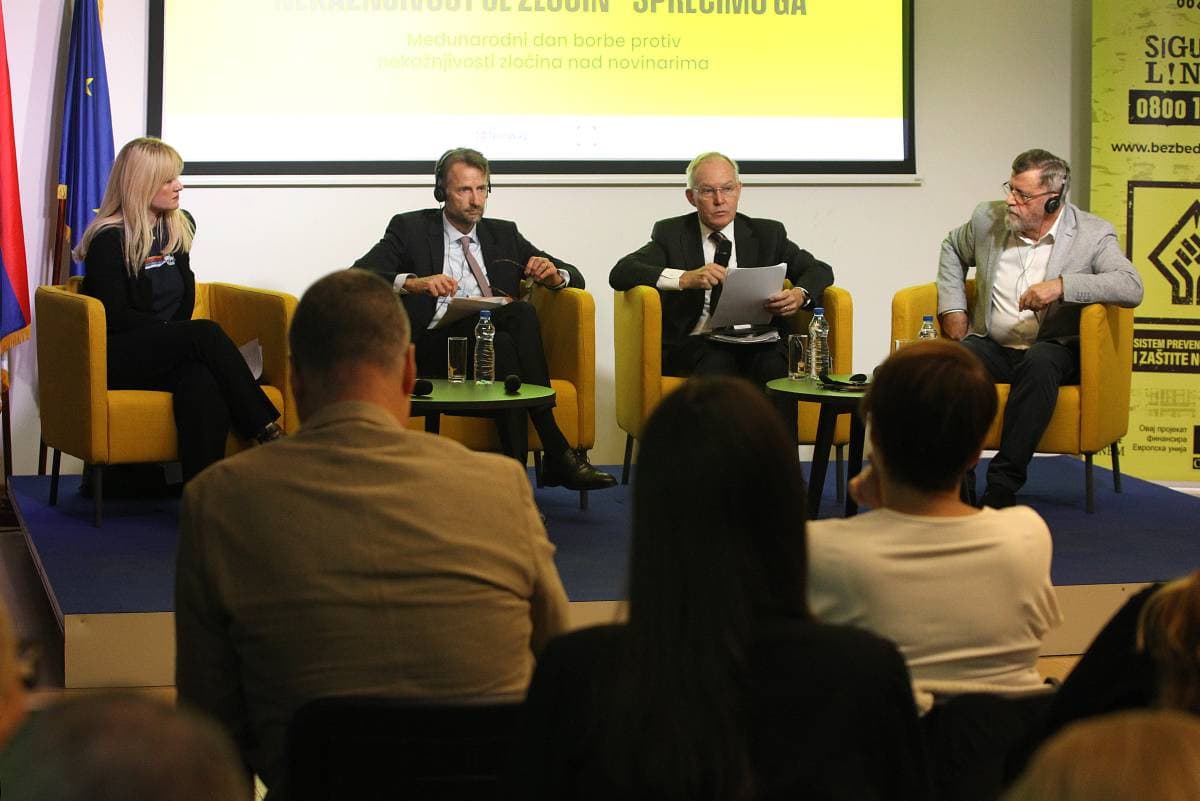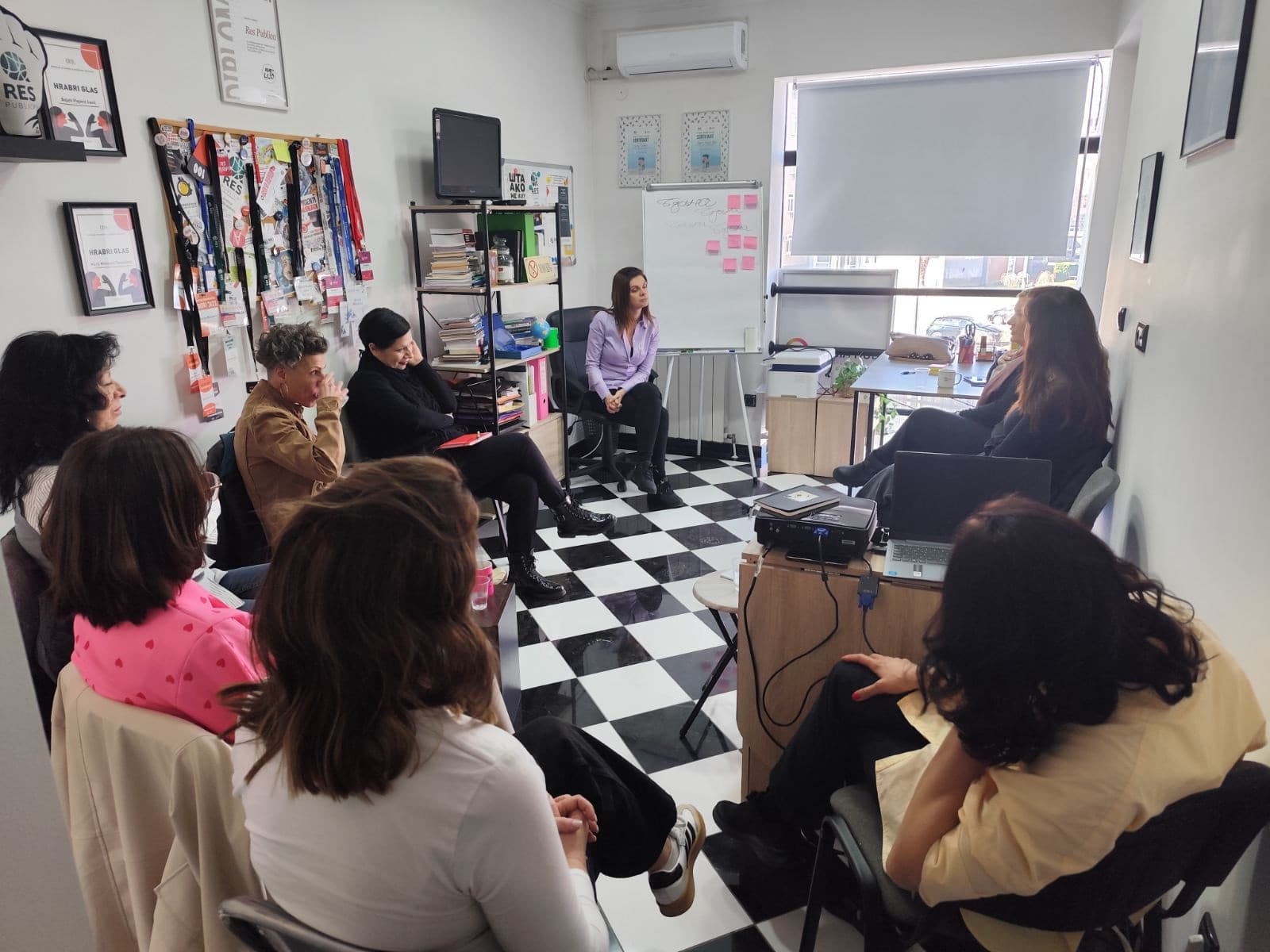Impunity for crimes against journalists in Serbia is nearly one hundred percent.
Impunity for attacks on journalists must not become the new normal, as it directly affects media freedom, the right of citizens to be informed, and consequently, democratic society. This was emphasized at the event marking the International Day to End Impunity for Crimes against Journalists, titled "Impunity is a Crime – Let's Prevent It," organized by the Association of Independent Electronic Media (ANEM) and the Organization for Security and Co-operation in Europe (OSCE) at the European House in Belgrade.

OSCE Representative on Freedom of the Media Jan Bratu emphasized on this occasion that impunity is not only a failure of the judiciary but a threat to society as a whole, stating that "when journalists are silenced, corruption grows, public debate weakens, and citizens lose trust in institutions."
"State authorities have a positive obligation to protect journalists. This means that attacks should be investigated immediately and independently, all responsible parties should be prosecuted, and legal remedies should be provided to victims and their families. Investigations and trials for attacks, both old and new, must be carried through to completion, threats, including those made online, must be taken seriously, and public officials must clearly and publicly condemn every attack. Silence in the face of violence means complicity," Bratu assessed.
He recalled 18 cases of unresolved murders and kidnappings of journalists in Kosovo from 1998 to 2005, as well as the unresolved murders of Dada Vujasinović, Slavko Ćuruvija, and Milan Pantić.

"They were independent and critical voices, silenced to prevent the spread of 'unpleasant truths and opinions.' We must not forget the campaigns of slander and disinformation that preceded their murders," the OSCE representative stated.
According to the data from the UNESCO Observatory on Killed Journalists, more than 1,800 journalists have been killed worldwide since 1993. He also noted that, according to the International Federation of Journalists, at least 225 journalists and media workers have been killed in Gaza, many of them as a result of direct targeted attacks.
"I appreciate the principled solidarity of ANEM in launching the 'Voices from Gaza' initiative, as well as the 'Minute of Silence' action organized by the journalists' associations NUNS and UNS in collaboration with the Institute for Media Diversity in the Western Balkans," Bratu pointed out.
EU Ambassador to Serbia Andreas von Bekarat stated that 95 cases of violations of journalists' freedom were recorded in Serbia in the first six months of this year, and that, according to data from media and journalist associations, these numbers are much higher. According to him, journalists in Serbia are at increasing risk and he also reflected on the unresolved cases of journalists' murders.

"Attacks on journalists are attacks on democracy itself. Without accountability, the cycle of attacks on journalists will continue, directly jeopardizing the right of citizens to be informed. Serbia is a candidate country for EU membership and progress in media freedoms is a key criterion in this process. The behavior of the police is alarming, as they either do not react or actively prevent journalists from reporting on protests," Bekarat emphasized, adding that it is crucial to see whether society is willing to protect journalists and ensure they do not work in fear.
Chairman of the Board of the Association of Independent Electronic Media (ANEM) Veran Matić assessed that the last two years regarding media freedoms in Serbia have been the worst since 2000. He highlighted that impunity is almost absolute, considering there has been one conviction per year in 2024 and 2025.
"Last year and since the beginning of this year, the new normal is that the Ministry of Internal Affairs is resolving fewer cases of attacks on journalists. Impunity usually occurs in the most severe cases. Physical attacks on our colleagues Vuk Cvijić, Uglješa Bokić, on female journalists, cameramen, and photographers remain unresolved, sending a message to society – there is no justice for those who bring the truth to the public," Matić said.

According to him, the work of tabloid media is entirely based on lies and hate speech. He added that they conduct campaigns against journalists, prosecutors, and judges without any obstacles, which not only constitutes criminal acts and exerts pressure but also endangers safety.
"It has become normal for the president, representatives of the executive and legislative authorities to not only tolerate this practice but also support and encourage it, through numerous abuses of project co-financing and other means, financing factories of lies and the production of evil. Meanwhile, public services ignore the public interest. Everything that was not normal, everything that undermines democracy, has been normalized in the last two years. Human rights, along with the word democracy, are trampled upon daily," Matić explained.
Media law attorney Kruna Savović presented a monitoring report on the media scene in Serbia over the past year, reminding, month by month, of the most drastic cases of violations of media freedoms.
"In the past year, we have transitioned from a phase where most recorded threats to journalists were made online, to a phase where violence against them is occurring in the real world, perpetrated even by members of the police present at the scene," attorney Savović reminded.

She also commented on the effects of reports submitted to the internal control services of the Ministry of Internal Affairs. One of the official, alarming, and indicative responses was that the person who attacked the cameraman could not be identified, despite the existence of recordings and internal records regarding which police officer was assigned to which location on which day.
Attorney Savović also recalled that a large number of journalists were prevented from reporting in the enclosed and tent-covered space in front of the National Assembly of the Republic of Serbia, and that there were numerous incidents and detentions. She highlighted that photo-reporters, whose work is crucial for informing the public, have been particularly victimized over the past year.
Representatives of the Independent Journalists’ Association of Serbia (NUNS) reported that, according to the latest data, there were 300 recorded cases of attacks, threats, and pressures in 2025, but that a large number of cases are yet to be entered into their database.
"Of these, 133 are threats, 90 are physical attacks, and six are attacks on the media. The rest are pressures, which are much more numerous. There is also a significant number of unreported cases of attacks on journalists during protests, likely due to distrust in institutions and fear, which is most pronounced among young journalists and those from local areas," noted Marija Babić, a lawyer with NUNS.
The International Day to End Impunity for Crimes Against Journalists is observed every November 2, as a day designated by the United Nations General Assembly to draw global attention to one of the most urgent challenges for freedom of expression and access to information – the safety of journalists and the issue of impunity for crimes committed against them.
The event was held as part of the project "System for the Prevention of Violence and Protection of Journalists" implemented by ANEM in partnership with Insajder TV and the Center for the Development of Local Media, with the support of the European Union, the governments of Norway and Switzerland, and the Balkan Fund for Democracy, the OSCE Mission in Serbia, and the Ministry of Information and Telecommunications of the Republic of Serbia.
Related Articles

"Protecting Local Media": SRG Meeting Held with Journalists Ahead of Local Elections in Bor on March 29

The fourth training for the safety of female journalists and media workers was held in Kragujevac.



%20%C4%86ao%20Nevena%20VERAN%20MATI%C4%86%20Vlast%20%C5%BEeli%20da%20istrebi%20novinare%20-%20YouTube.png&w=3840&q=75)








